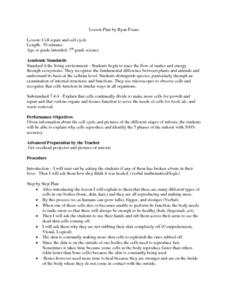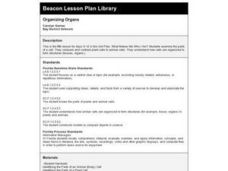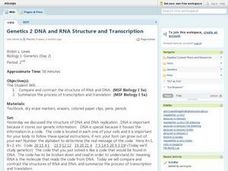University of Minnesota
Dendritic Spines Lab
This is your brain on drugs ... literally! Your neuroscientists-in-training examine the evidence of drug use on the human brain and how neurons change their connectivity when altered by drugs. They then work together to create testing...
Curated OER
Cell Repair and Cell Cycle
Seventh graders explore the cell cycle. They view pictures of different stages of mitosis and explain why cells reproduce. They identify the five phases of mitosis: interphase, prophase, metaphase, anaphase, and telophase.
Curated OER
Onion Skins
Students explore the structure of a plant cell. They carefully peel a single layer of onion skin from a slice of onion and stain it with methylene blue to observe the structures inside. They use a Digiscope connected to a computer to...
Curated OER
The Living Environment
Sixth graders show what they know about plant and animal cells. In this cell project instructional activity, 6th graders get to choose a project based on their learning style. They can create a visual representation of cells, auditory...
Curated OER
Organizing Organs
Fifth graders research plant and animals cells and create a Venn Diagram to show the similarities and differences.
Curated OER
The Characteristics of Living Things
Eighth graders explore the characteristics of living things. In this living things lesson plan, 8th graders review as a class the cell theory and the characteristics of living things. They answer questions about how to determine if...
Curated OER
The Microscopic World
Young scholars identify magnification by first using a magnifying glass and then with photos taken through a microscope. They complete a handout that leads them through each activity stated. Finally, students use their microscope to...
Curated OER
DNA and RNA Structure and Transcription
Students compare and contrast the structure of RNA and DNA.They summarize the process of transcription and translation. The lesson uses an inquiry model and the use of codes in DNA.
Curated OER
Science Lessons
Tenth graders research about the different cell organelles. For this series of biology lessons, 10th graders compare two allotropes of carbon. They investigate how the rate of reaction is affected by concentration.
Curated OER
Pond 2: Life in a Drop of Pond Water
Learners observe organisms found in pond water with a microscope. In groups, they discuss how single-celled organisms satisfy their needs for food, water and air. They compare and contrast the needs of macroscopic and microscopic...
University of Minnesota
Sheep Brain Dissection
Bored with frog and earthworm dissections? Had your fill of fetal pigs? Anatomy young scholars will be intrigued by the sheep's brain, and you will be prepared with guiding questions, extension activities, and pictures as they dissect...
Virginia Department of Education
Animal Phyla and Plant Divisions
Searched hours for an activity that allows individuals the ability to use multiple resources to learn about both plant and animal kingdoms? This discussion and activity provide pupils with the ability to visualize each organism...
Curated OER
Frogs and Camouflage
Students view a variety of pictures of frogs and discuss camouflage and habitat adaptation. Students look at color, skin texture, shape, size, eyes, and surroundings as well as the need for the camouflage. Students then design a frog...
Curated OER
Organelles
Students explore the functions of major eukaryotic organelles. They compare and contrast prokaryotic and eukaryotic cells. Given diagrams and drawings, students take turns drawing structures, discussing their function, and labeling...
Curated OER
Pete And Repeat
Students draw a picture of a person from popular culture, then "clone" it using printing techniques in this Art lesson that tackles the questions surrounding cloning, DNA, and current scientific techniques. An emphasis is placed on the...
Curated OER
Tables
Students design a web page table with rows and columns of text in a gridded display. They write a HTML for integrated layout schemes of text and pictures. They create a table that has different colored cells.
Curated OER
KARYOTYPE ALTERNATIVES
High schoolers comprehend that karyotyping is a process in which chromosomes are cut from an enlarged picture and arranged in decreasing order of size. The cells to be viewed are first chemically treated to increase the number of...
Curated OER
Karyotype Alternatives
Learners study karyotyping, which is a process in which chromosomes are cut out from an enlarged picture and arranged in decreasing order of size. They use a template to arrange and glue chromosomes to data sheet, indicate sample code,...
Curated OER
The Long Road to Coffee
Students organize picture cards of the sequene of how food gets from a farm to their home. They then sequence cards of how coffee grown in Colombia gets to their home comparing the differences.
Curated OER
Civil War
Fifth graders discuss the causes of the Civil War and write a paragraph summarizing each identified event. In the computer lab, 5th graders create a PowerPoint presentation explaining events leading up to the Civil War. They use the...
Curated OER
Dinoflagallates of Bioluminescent Bay
Fifth graders research dinoflagallates of the Bioluminescent Bay. They research the Internet for pictures of the Bio Bay and discuss the difference between ecosystems and ecoregions. They research a marine ecoregion and create a poster.
Virginia Department of Education
Classification of Organisms
Searching for the perfect indoor/outdoor activity that allows class members the opportunity to learn about organism classification? Here, pupils research organisms and categorize them according to domain and kingdom over the course...
Science 4 Inquiry
The Real Story of Where Babies Come From
Pupils learn about both male and female anatomy before understanding how they work together to make a baby. Scholars discover new vocabulary, create a presentation on fertilization, and discuss related topics.
Agriculture in the Classroom
Design 'Y'er Genes
How do changes in DNA affect an organism? Scholars explore chromosomes, genes, DNA, and mutations by modeling the DNA of a strawberry. They build a DNA model, then manipulate it to show how changing the genes transforms the strawberry...























